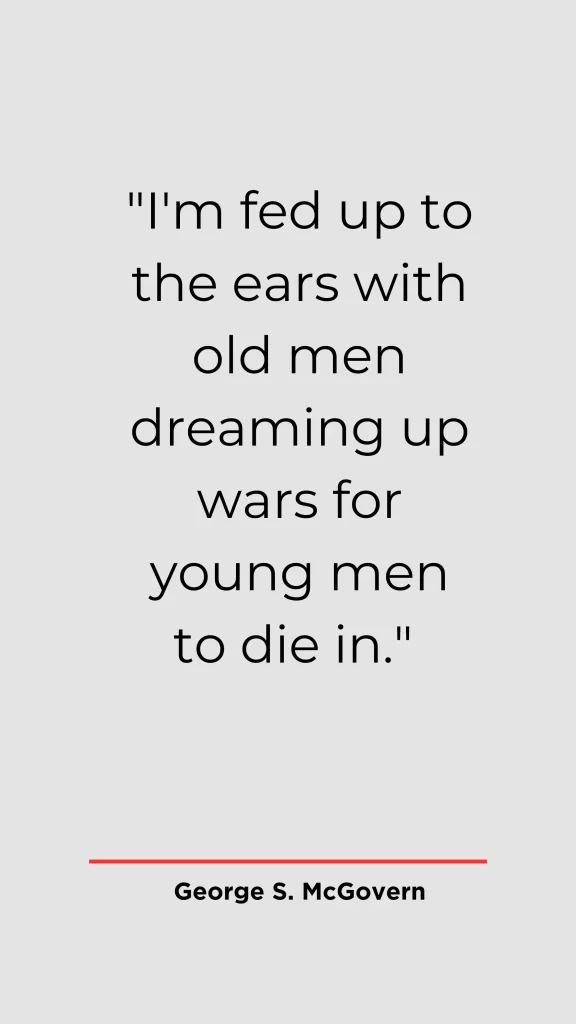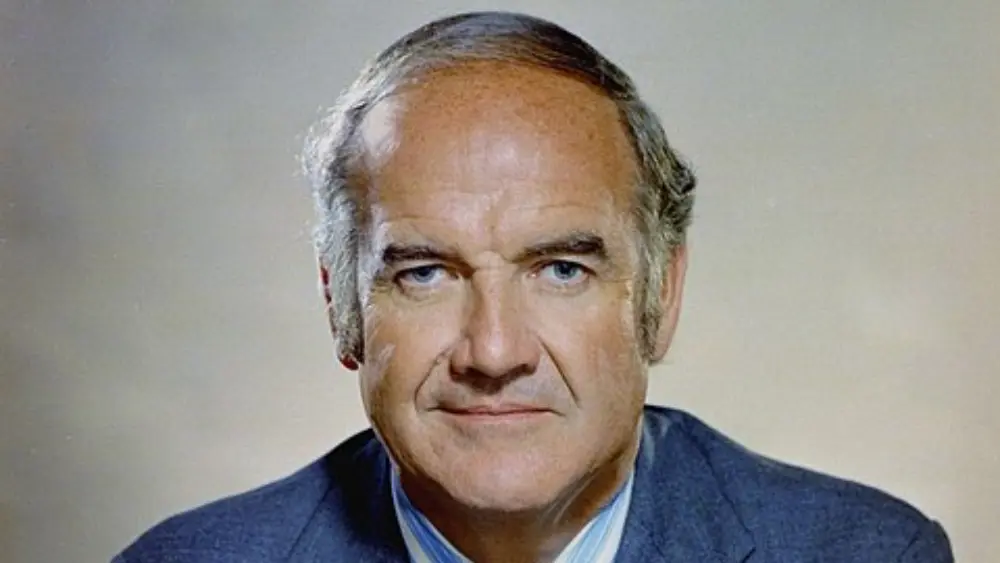George Stanley McGovern, born on July 19, 1922, in Avon, South Dakota, was a dedicated American statesman whose life was defined by a profound commitment to public service. McGovern’s political career spanned several decades and was marked by his passionate advocacy for social justice, civil rights, and an end to hunger.
Early Life and Military Service
George McGovern’s formative years were deeply influenced by the hardships of the Great Depression, a period marked by economic turmoil and widespread suffering. Growing up during this era instilled in him a profound sense of empathy for the struggles faced by the impoverished and the hungry. These early experiences would go on to shape his political ideology and commitment to addressing social and economic inequalities.
McGovern’s military service during World War II further shaped his perspective and character. He served as a B-24 bomber pilot, bravely flying numerous combat missions over Europe. This firsthand experience exposed him to the grim realities and devastation of war, providing a stark contrast to the relative tranquility of his pre-war life. His wartime service not only solidified his commitment to peace and diplomacy but also influenced his later political career, as he became a vocal advocate for ending the Vietnam War and promoting international cooperation to prevent future conflicts.
Post-War Education and Activism
Following his service in World War II, George S. McGovern seized the opportunity provided by the G.I. Bill to continue his education. He pursued a Ph.D. in history and government at Northwestern University, a testament to his unwavering commitment to intellectual growth and understanding. McGovern’s post-war academic pursuits not only broadened his horizons but also laid the foundation for his future political career.
While engaged in academic pursuits, McGovern simultaneously ventured into the realm of Democratic Party politics. His passion for social justice and his experiences in the war instilled in him a strong desire to effect change through political activism. This period marked the beginning of McGovern’s transformation into a prominent political figure, as he combined his intellectual acumen with his commitment to Democratic ideals, ultimately leading him on a path to a distinguished career in American politics.
Entry into Politics
George S. McGovern’s foray into politics took a significant step forward in 1956 when he was elected to the U.S. House of Representatives, representing the state of South Dakota. His tenure in Congress during those early years was characterized by a passionate commitment to several key issues. McGovern emerged as a staunch supporter of civil rights, advocating for equal rights and opportunities for all Americans regardless of their race or background. His principled stance on civil rights aligned with his broader dedication to social justice and equality.
Additionally, McGovern’s advocacy extended to addressing the pressing issues of hunger and poverty in the United States. He became a vocal proponent of policies aimed at combating these pressing challenges, emphasizing the need for government intervention to ensure a more equitable society. Through his work in the House of Representatives, George S. McGovern laid the groundwork for a political career marked by a tireless dedication to progressive causes and a steadfast commitment to making a positive impact on the lives of the American people.
George S. McGovern: Hunger and Food Security
George S. McGovern’s legacy includes significant contributions to the field of hunger and food security. His dedication to addressing global hunger issues was exemplified by his co-authorship of the Food for Peace program, a landmark initiative that aimed to provide essential food assistance to countries facing dire need. This program not only reflected his compassionate outlook but also underscored his commitment to alleviating suffering and promoting peace through humanitarian efforts.
McGovern’s involvement in food security matters didn’t end with his co-authorship of the program; he went on to serve as the director of the Food for Peace program under President John F. Kennedy. In this influential role, he played a pivotal part in shaping and implementing policies aimed at ensuring that food assistance reached those most in need around the world. His commitment to combating hunger and advancing global food security left a lasting impact, reflecting his deep conviction that addressing this urgent issue is a moral imperative.
Presidential Candidacy
In the pivotal year of 1972, George McGovern embarked on a historic presidential campaign, seeking the Democratic nomination for President of the United States. His campaign was anchored in a clear and unwavering platform that resonated deeply with a segment of the American populace. McGovern’s candidacy was defined by his vocal opposition to the ongoing Vietnam War, making him a prominent anti-war figure during a time of intense debate and dissent. Additionally, he championed the cause of civil rights and positioned himself as a staunch advocate for social justice, addressing the pressing issues of inequality and poverty that plagued the nation.
While George McGovern faced formidable challenges during his presidential campaign and was ultimately defeated by incumbent President Richard Nixon in the general election, his principled stance left a lasting impact on American politics. His campaign galvanized a dedicated following of Americans who shared his vision for a more just and compassionate society. McGovern’s legacy endures as a symbol of the power of conviction in politics, reflecting the ability of a candidate to inspire and mobilize citizens around a platform grounded in deeply held values and principles.
George S. McGovern: Later Political Career
George S. McGovern’s political career extended beyond his 1972 presidential campaign. He maintained a strong presence in the U.S. Senate, where he served from 1963 to 1981. During his tenure, McGovern was a tireless advocate for a range of progressive causes. He played a significant role in advocating for agricultural reform, seeking to address the challenges facing farmers and the agricultural industry. Additionally, McGovern championed anti-poverty programs and healthcare initiatives, reflecting his enduring commitment to social justice and the welfare of all Americans.
In a testament to his enduring passion for public service, McGovern made another bid for the presidency in 1984. However, he faced stiff competition in the Democratic primaries and ultimately did not secure the party’s nomination. Despite this setback, his second presidential campaign underscored his dedication to his ideals and the enduring influence of his political legacy. George S. McGovern’s later political career continued to reflect his unwavering commitment to advancing progressive policies and advocating for the marginalized and vulnerable in American society.
Humanitarian Work
Even after departing from active politics, George S. McGovern continued to channel his dedication to humanitarian causes. He characterized his post-political career with an unwavering commitment to addressing global hunger and food insecurity. In recognition of his passion and expertise in this field, they appointed him as the United Nations Global Ambassador on World Hunger, a role in which he tirelessly advocated for international efforts to alleviate hunger and promote food security.
Furthermore, McGovern co-founded the Food Research and Action Center, an organization that became a vital force in combating hunger, not only in the United States but also on a global scale. Through his leadership and tireless advocacy, he worked to raise awareness, mobilize resources, and develop policies aimed at eradicating hunger and ensuring access to nutritious food for all. George S. McGovern’s post-political humanitarian work solidified his reputation as a dedicated advocate for the most vulnerable and a tireless champion in the fight against hunger and food insecurity worldwide.

George S. McGovern: Legacy
George S. McGovern’s legacy stands as a testament to his enduring commitment to the core principles of social justice, civil rights, and humanitarianism. Throughout his political career, he was an unflinching advocate for the most vulnerable in society, tirelessly working to address issues like hunger, poverty, and inequality. His unwavering dedication to combating global hunger and food insecurity, as well as his role as the United Nations Global Ambassador on World Hunger, showcased his deep sense of compassion and his belief in the moral imperative of aiding those in need.
Moreover, McGovern’s principled opposition to the Vietnam War and his commitment to ending the conflict resonated with many Americans who were grappling with the complex and divisive issues of that era. His legacy extends beyond his political career, serving as a reminder of the power of conviction and the enduring impact of individuals who dedicate themselves to making the world a more just and compassionate place. George S. McGovern’s contributions to social justice, civil rights, and humanitarian causes continue to inspire and shape the course of American politics and society.








